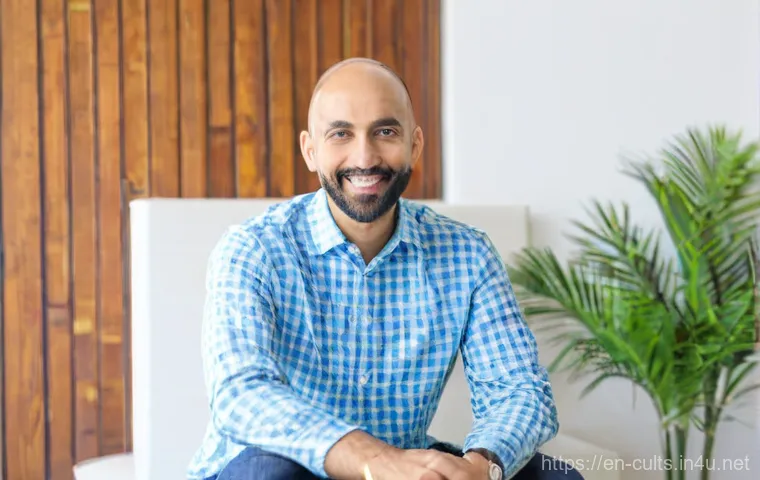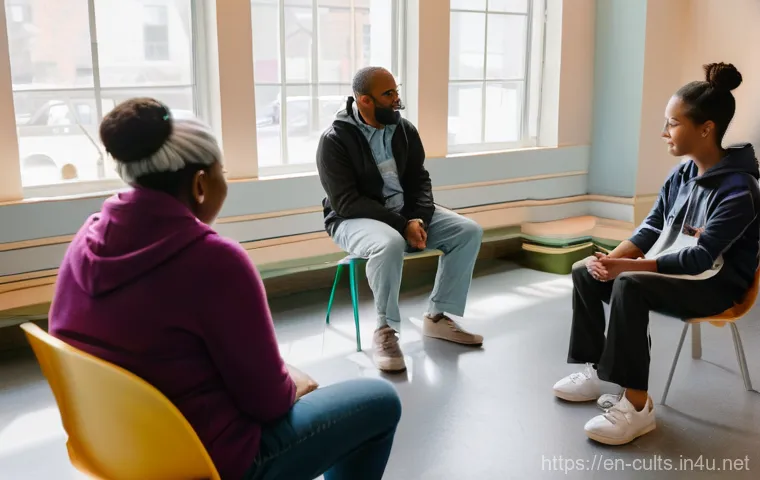Have you ever scrolled through your feed and stumbled upon a group or an idea that just made you pause and wonder, “What on earth is going on there?” In our super-connected world, beliefs, movements, and ideologies are constantly popping up and spreading faster than ever before.
From the resurgence of fascinating new spiritual paths to the unsettling rise of extreme fringe groups and the constant battle against online misinformation, understanding the landscape of human belief has never felt more crucial.
It’s truly a wild west out there, and frankly, it can be a little overwhelming trying to make sense of it all. As someone who’s spent years observing how these powerful ideas shape our society, I’ve personally seen the profound impact, both positive and negative, they can have on individuals and communities.
It’s not just about distant, obscure groups anymore; these trends are actively influencing our daily lives, our politics, and even our personal choices.
That’s why the work of dedicated research institutes, those deep-diving into these complex phenomena, is absolutely indispensable. They’re the ones helping us untangle the threads, providing clear, unbiased insights when emotions often run high.
Without them, we’d be completely adrift in a sea of unchecked narratives and potential vulnerabilities. So, what exactly do these vital institutions do, and why is their rigorous, fact-based work more important than ever for navigating our increasingly complex social fabric?
Let’s dive in and truly get to the bottom of it. Let’s find out exactly how these crucial organizations help us understand our world more clearly!
Unpacking the “Why”: Getting to the Core of Belief

Honestly, I’ve spent years observing how powerful ideas take root, and what really fascinates me is the sheer human need to belong, to find meaning, to connect. It’s a fundamental drive that, when channeled positively, builds incredible communities. But when things go sideways, it can lead people down paths that are confusing, isolating, or even harmful. These research institutes aren’t just looking at the surface-level behaviors; they’re digging deep into the psychological and sociological underpinnings. They’re asking the tough questions: What unmet needs are these groups addressing? What vulnerabilities are being exploited? What makes a seemingly innocuous idea morph into something destructive? From my own vantage point, having seen many friends and acquaintances grapple with online radicalization, it’s clear that understanding the emotional landscape is just as crucial as understanding the intellectual arguments. We can’t simply dismiss these phenomena as “crazy people”; there’s often a very human story behind every person who gets drawn into a new belief system, and these institutes are trying to piece together those narratives to offer real solutions. It’s not about judging, but about genuinely comprehending the dynamics at play so we can support those who might be vulnerable.
The Human Need to Belong
Think about it: from the moment we’re born, we’re hardwired for connection. We crave acceptance, validation, and a sense of purpose. When mainstream society or traditional institutions don’t provide that, people naturally seek it elsewhere. My personal journey has shown me that this desire for belonging is incredibly powerful, sometimes overriding critical thinking. These groups, whether they’re spiritual communes or online forums, often offer a powerful sense of community, a clear purpose, and definitive answers in a world that often feels chaotic and uncertain. It’s a compelling package, especially for those feeling lost or marginalized. Research dives into how this powerful human need is leveraged, both constructively and, unfortunately, manipulatively, to attract and retain members. It’s truly eye-opening to see how carefully crafted narratives can fill an emotional void.
When Good Intentions Go Awry
It’s a tricky tightrope, isn’t it? Many movements start with genuinely positive intentions – wanting to improve the world, seek truth, or help others. I’ve personally seen how enthusiasm and idealism can slowly, almost imperceptibly, shift into something less benign. The line between passionate belief and dogmatic adherence can be incredibly fine. These institutes are crucial in identifying the subtle red flags: the increasing isolation from external contacts, the demands for unquestioning loyalty, the demonization of outsiders, or the financial exploitation that can creep in. They help us understand the mechanisms by which a benign communal experience can evolve into a high-control group, offering early warning signs for individuals and families who might be struggling to understand what’s happening to their loved ones. From my perspective, recognizing these shifts early on is paramount for intervention and support.
Navigating the Digital Wild West: Battling the Echo Chambers
Let’s be real: the internet has completely changed the game. What used to take years to spread now goes viral in hours. When I first started observing these trends, misinformation was a nuisance; now, it feels like a constant barrage, shaping opinions and even elections. These research centers are at the forefront of understanding how algorithms amplify certain narratives, how echo chambers form, and how easily false information can be crafted and disseminated. They aren’t just sitting in ivory towers; many of them are actively tracking online conversations, analyzing propaganda techniques, and developing strategies to counter the spread of harmful content. My own experience scrolling through various platforms has shown me just how quickly a conspiracy theory can snowball, gaining traction and becoming entrenched in people’s belief systems. It’s truly a digital wild west out there, and without dedicated researchers mapping the terrain, we’d be completely lost, constantly falling prey to expertly crafted deception. Their work feels incredibly urgent in our hyper-connected world where truth can often feel optional.
Spotting the Red Flags Online
If you’re anything like me, you’ve probably stumbled across some truly bizarre content online and wondered, “How do people fall for this?” But it’s not always so obvious. These institutes have taught me to look beyond the sensational headlines and examine the source, the language, and the emotional manipulation often at play. They equip us with the tools to recognize common tactics used by those spreading misinformation, whether it’s through cherry-picked data, ad hominem attacks, or appeals to emotion over logic. They help identify patterns in content creation and dissemination that signal a concerted effort to mislead. Personally, I’ve found that learning to pause and critically evaluate information before sharing it has become one of my most important digital skills, and it’s thanks to insights from this kind of rigorous research that I’ve sharpened that ability.
Building Your Digital Resilience
It’s not enough just to spot the red flags; we also need to build our own resilience against online manipulation. These research efforts contribute directly to educational programs and public awareness campaigns that empower individuals. They help us understand cognitive biases that make us susceptible to certain narratives and teach us how to develop a healthier relationship with online information. From my perspective, it’s about becoming an active participant in our information diet, rather than a passive consumer. It’s about strengthening our critical thinking muscles so we’re less likely to be swayed by emotionally charged or factually dubious content. The more we understand the psychological hooks, the better equipped we are to protect ourselves and our communities from the insidious effects of online echo chambers and coordinated disinformation campaigns.
Safeguarding Our Communities: Why Research Isn’t Just Academic
When we talk about “research,” it might sound a bit dry or academic, but let me tell you, the implications of this work are incredibly practical and profoundly impactful on our daily lives. These institutes are doing the heavy lifting to ensure that our communities, from local neighborhoods to national policy-making bodies, are better prepared to handle complex challenges. I’ve personally seen how their insights translate directly into actionable strategies for educators, law enforcement, and mental health professionals. They’re not just publishing papers; they’re providing the foundational understanding needed to craft effective interventions, to prevent harm, and to support individuals and families navigating difficult situations. It’s about creating a society that’s more resilient, more informed, and ultimately, safer for everyone. Their commitment to sharing objective, evidence-based findings is, in my honest opinion, what separates real progress from endless cycles of reactive problem-solving. This isn’t just theory; it’s about making a tangible difference in people’s lives right now.
Informing Policy, Protecting People
One of the most vital roles these organizations play is providing objective data and expert analysis to policymakers. How can we create effective laws or allocate resources wisely if we don’t truly understand the nature of the challenges we face? They’re the ones offering unbiased insights into the prevalence of certain belief systems, their social impacts, and potential risks, which is absolutely critical for crafting sensible public policy. From my experience, politicians and community leaders often operate on anecdotal evidence or public outcry, but these researchers bring rigorous, fact-based understanding to the table. They help identify emerging threats and inform preventative measures, ensuring that legislative responses are proportional, effective, and protective of individual rights while still safeguarding public well-being. This direct influence on policy means real-world protections for vulnerable populations.
Empowering Educators and Parents
As a society, we have a responsibility to equip the next generation with the tools they need to navigate a world brimming with diverse and sometimes conflicting ideologies. This is where these research institutes shine. They develop resources and training programs that help educators teach critical thinking skills, media literacy, and healthy skepticism in age-appropriate ways. For parents, like many I know, who often feel overwhelmed by the sheer volume of information their kids encounter online, these organizations offer invaluable guidance on how to talk to children about controversial topics, identify potential red flags in online content, and foster a healthy intellectual curiosity. Personally, I’ve seen parents find immense relief and empowerment through these resources, feeling better equipped to protect their children and guide them through the digital landscape with confidence.
The Power of Understanding: Bridging Divides, Not Widening Them
It’s easy to get caught up in the sensationalism surrounding extreme groups or polarizing beliefs. The news often focuses on the conflict, the drama, the “us vs. them” narrative. But what these research institutes consistently remind me of is the profound power of understanding – not to condone, but to comprehend. My personal belief is that true progress comes not from condemnation, but from informed dialogue. Their work fosters a space where we can examine these complex phenomena without immediate judgment, allowing for a more nuanced and ultimately more effective approach to societal challenges. When we understand the underlying motivations, the historical context, and the psychological draw of certain ideologies, we’re better positioned to bridge divides, or at least to prevent them from widening further. It’s about moving beyond reactivity and towards a proactive, empathetic engagement with the diverse tapestry of human belief, even when those beliefs challenge our own. This deep dive into understanding is truly an investment in a more cohesive society.
Fostering Critical Thinking
One of the most profound impacts of this research is its contribution to fostering critical thinking, a skill that feels increasingly precious in our fast-paced world. These organizations often publish accessible analyses and frameworks that help the public, and particularly younger generations, develop the capacity to evaluate information independently, question assumptions, and resist simplistic answers. From my own journey, I’ve found that true critical thinking isn’t about being cynical, but about being discerning and open-minded enough to follow evidence wherever it leads. This intellectual rigor, cultivated by the work of these institutes, is essential for a healthy democracy and an informed citizenry. They empower us to be active thinkers rather than passive recipients of information, which is a game-changer when navigating complex ideologies.
Promoting Dialogue, Not Dogma

In a world often shouting past itself, these research bodies quietly champion the importance of dialogue. They provide a neutral ground for discussing sensitive topics, bringing together diverse perspectives based on factual inquiry rather than emotional rhetoric. My experience has taught me that real conversations, the kind that lead to understanding and not just further entrenchment, can only happen when there’s a shared commitment to truth and a willingness to listen. These institutes offer evidence-based insights that can de-escalate tensions and promote productive discussions about challenging beliefs. They help us understand the nuances, allowing us to engage with individuals who hold differing views in a way that’s respectful and constructive, rather than immediately confrontational. It’s about building bridges where possible and understanding walls where they exist.
From Fringe to Mainstream: Tracking the Evolution of Ideas
It’s truly incredible how some ideas, once relegated to obscure corners of the internet or whispered in hushed tones, can sometimes burst into the mainstream, profoundly impacting our society. I’ve personally witnessed this evolution, and it’s a process that these dedicated research institutes are constantly tracking and analyzing. They act like intellectual seismographs, detecting the tremors of emerging beliefs and assessing their potential to grow. It’s not about sensationalism; it’s about rigorous, systematic observation of how new ideologies gain traction, adapt, and sometimes, astonishingly, become widely accepted. Understanding this journey from fringe to mainstream is absolutely critical for predicting future social trends, addressing potential challenges before they escalate, and recognizing when a shift in public consciousness is genuinely occurring versus when it’s merely a temporary fad. This foresight, born from their meticulous work, is an invaluable asset for navigating our ever-changing cultural landscape.
The Life Cycle of a Movement
Just like any living organism, movements and ideologies have a life cycle, and these research institutes are adept at mapping it out. They study everything from the initial sparks that ignite a new belief system to its periods of rapid growth, consolidation, potential fracturing, and sometimes, even its decline. Personally, I find it fascinating to see how they identify key inflection points – the charismatic leaders who emerge, the critical events that accelerate growth, or the internal conflicts that lead to schisms. By understanding these patterns, we gain a much clearer picture of how powerful ideas propagate through society. This deep analysis helps us recognize if a movement is likely to dissipate quickly or if it has the structural integrity and emotional appeal to become a lasting force, whether for good or ill. It’s a complex dance, and these researchers are the choreographers, explaining each step.
Predicting Future Trends
One of the most forward-looking aspects of their work is the effort to predict future trends. While no one has a crystal ball, these institutes use their vast datasets and analytical frameworks to anticipate what might be next on the horizon. By tracking shifts in societal discontent, technological advancements, and global events, they can offer educated projections about the types of movements or beliefs that might emerge or gain prominence. My own years of observation have reinforced that understanding historical patterns is often the best guide for predicting the future, and these researchers are master historians of social phenomena. Their ability to forecast potential challenges, whether it’s the rise of new forms of digital extremism or the resurgence of particular spiritual paths, gives governments, communities, and individuals a critical head start in preparing for what lies ahead. This proactive approach is simply indispensable in a rapidly evolving world.
Why Your Support for Unbiased Insights Is a Game Changer
I genuinely believe that in our increasingly complex world, the work of these independent research institutes isn’t just important; it’s absolutely vital. They are the lighthouses guiding us through murky waters, providing objective, evidence-based insights when emotions often run high and facts can feel slippery. This isn’t just about abstract academic pursuit; it’s about investing in our collective ability to understand ourselves, our neighbors, and the powerful ideas that shape our societies. My personal journey has shown me that unbiased information is the bedrock of a healthy, informed public discourse. Without their meticulous work, we’d be adrift in a sea of unchecked narratives, vulnerable to manipulation, and perpetually reacting to crises instead of proactively addressing their root causes. Supporting these institutions isn’t charity; it’s a strategic investment in the intellectual infrastructure that underpins a resilient and discerning society. It truly is a game-changer for how we navigate the future.
Investing in Our Collective Future
When you support these organizations, you’re not just donating to a cause; you’re investing in the very fabric of our collective future. You’re helping to fund the critical research that informs sound policy, educates the public, and empowers individuals to make better decisions. From my perspective, this is an investment that yields dividends for everyone, contributing to a more informed, resilient, and ultimately more peaceful society. It’s about building a robust defense against misinformation and extremism, and fostering an environment where critical thinking and respectful dialogue can flourish. Imagine a world where every major societal challenge is approached with deep, unbiased understanding rather than knee-jerk reactions; that’s the future these institutes are working to build, and it’s a future worth investing in.
The Ripple Effect of Knowledge
The knowledge generated by these research institutes doesn’t stay confined to academic journals; it creates a powerful ripple effect that touches countless lives. Their findings inform journalists, shaping the stories we read and watch. They guide educators, helping shape curricula that prepare students for the complexities of the modern world. They equip parents with tools to protect their children and foster critical thinking at home. From my years observing this field, I’ve seen firsthand how a single, well-researched report can spark conversations, challenge assumptions, and ultimately shift public understanding on critical issues. It’s a testament to the idea that knowledge truly is power, and when that power is wielded responsibly and objectively, its impact can be transformative for individuals and communities alike. Each piece of insight builds on the last, creating an ever-expanding pool of understanding that benefits us all.
| Area of Impact | Specific Contribution of Research Institutes | Why It Matters to You |
|---|---|---|
| Public Safety & Security | Identify and analyze dangerous extremist movements, providing intelligence to law enforcement and policymakers. | Helps prevent violence, terrorism, and protects communities from harm. |
| Information Literacy | Research how misinformation spreads and develop educational tools to counter it. | Empowers you to discern truth from falsehood, protecting your mind and your decisions. |
| Social Cohesion | Understand factors leading to societal polarization and inform strategies for intergroup dialogue. | Fosters mutual understanding, reduces conflict, and builds stronger, more inclusive communities. |
| Individual Well-being | Study the psychological impact of high-control groups and provide resources for those affected. | Offers support and pathways to recovery for individuals and families impacted by harmful beliefs. |
| Policy Development | Provide objective data and expert analysis to inform evidence-based public policies and legislation. | Ensures that laws and government actions are fair, effective, and responsive to real societal needs. |
Wrapping Things Up
Whew, we’ve covered quite a journey today, haven’t we? It’s truly eye-opening to see how deeply interwoven our beliefs are with our sense of self and community. Honestly, I hope this deep dive has sparked some new thoughts for you, just as researching it did for me. Remember, understanding these complex dynamics isn’t about finding easy answers, but about building a more informed, empathetic, and resilient society where everyone can thrive. Let’s keep these conversations going!
Handy Insights You’ll Want to Keep
1. Always question the source: Before you accept any information, especially online, take a moment to look into who created it and what their agenda might be. A quick search can often reveal a lot about their credibility. This habit has saved me from falling for so much online noise.
2. Cultivate critical thinking: Treat every new idea as a hypothesis, not an absolute truth. Ask yourself: “What evidence supports this? What evidence contradicts it?” It’s a mental muscle that gets stronger with practice, and it’s invaluable for navigating today’s information overload.
3. Seek diverse perspectives: Challenge your own echo chamber by actively seeking out viewpoints that differ from yours. It doesn’t mean you have to agree, but understanding different angles broadens your perspective and helps you appreciate the complexity of issues.
4. Support independent research: Organizations dedicated to unbiased study provide the foundational knowledge we all need to make sense of the world. Their work is often overlooked but plays a crucial role in safeguarding our communities and informing public discourse.
5. Prioritize real-world connections: While online communities can be great, remember the importance of strong, supportive relationships offline. These connections provide a vital anchor and can offer a healthy counter-balance to the sometimes isolating or polarizing nature of digital interactions.
Key Takeaways to Remember
As we wrap up our exploration into the profound impact of beliefs and the invaluable role of research, there are a few core messages I truly hope resonate with you. First and foremost, never underestimate the human need for belonging and meaning; it’s a powerful force that drives us all, sometimes towards incredible connection, and other times, unfortunately, towards paths that might be less constructive. My own journey has taught me how crucial it is to understand the emotional and psychological underpinnings of why people embrace certain ideas, rather than simply dismissing them. Secondly, the digital landscape is a wild frontier, and developing your digital resilience—learning to spot misinformation and building critical thinking skills—is no longer optional; it’s a survival skill. We’re constantly bombarded, and being discerning is your best defense. Finally, remember that supporting independent, unbiased research isn’t just an academic endeavor; it’s a direct investment in the health, safety, and intellectual robustness of our communities. These institutes are on the front lines, providing the insights we need to inform policy, empower educators, and ultimately, bridge divides. Their work is a testament to the power of understanding in a world that often prioritizes division. Let’s champion objective truth and shared learning, because that’s how we build a stronger, more empathetic future together.
Frequently Asked Questions (FAQ) 📖
Q: What exactly do these vital research institutions actually do, day in and day out, to help us make sense of such complex societal trends?
A: Oh, that’s such a fantastic question, and one I get asked a lot! Believe me, it’s easy to picture these places as ivory towers, but their work is incredibly hands-on and vital.
From my perspective, having watched their impact for years, these institutes essentially act as our societal compasses. They’re not just reading headlines; they’re deep-diving.
They employ a fascinating blend of methodologies – think sociologists meticulously studying online communities, psychologists dissecting the drivers behind belief adoption, and political scientists analyzing the ripple effects of ideologies.
They collect vast amounts of data, often through direct engagement with communities, conducting in-depth interviews, and performing rigorous statistical analysis.
What really sets them apart, and what I find truly invaluable, is their commitment to objective analysis. In a world where everyone has an agenda, these researchers strive to present the facts as they are, without bias.
They help us understand why certain movements gain traction, how misinformation spreads, and what the potential societal consequences might be. It’s a painstaking process, but it’s how we get truly actionable, well-rounded insights, rather than just superficial observations.
Q: In a world where information spreads so quickly, often unchecked, why is the rigorous, fact-based work of these institutes more crucial than ever for our society?
A: You’ve hit on such a critical point! It truly feels like we’re living in an information maelstrom, doesn’t it? Things are moving at warp speed, and frankly, it can be terrifying how fast narratives, both beneficial and detrimental, can spread.
I’ve personally seen how easily well-intentioned people can get swept up in unchecked information, and that’s precisely why these institutions are absolutely indispensable right now.
Their rigorous, fact-based approach provides a much-needed anchor in this sea of noise. When emotions run high and divisive rhetoric takes over, these institutes offer a sanctuary of reason and evidence.
They equip us with the tools to discern truth from fiction, to understand the nuanced layers of complex issues rather than just reacting to soundbites.
Their work isn’t just academic; it’s a bulwark against polarization and a pathway to more informed public discourse. Without their dedicated efforts to meticulously verify information and provide clear context, we’d be even more vulnerable to manipulation and the fracturing of our social fabric.
It’s about protecting our collective ability to think critically and make sound decisions as a society.
Q: How can an average person like you or me really benefit from the insights these researchers uncover, and how can we use that knowledge to navigate our own lives more effectively?
A: This is where the rubber meets the road, right? It’s all well and good for academics to publish papers, but what does it mean for us? For me, the biggest takeaway is empowerment.
The insights from these research institutes are not just for policymakers or journalists; they’re incredibly practical for everyday life. Firstly, they help us become savvier consumers of information.
When you understand the psychological triggers behind certain online movements or the common tactics used in disinformation campaigns, you’re much less likely to fall prey to them.
It’s like having a superpower against online trickery! Secondly, their work fosters a deeper empathy and understanding of others. By learning about the diverse motivations and belief systems that shape different groups, we can approach conversations with more nuance and less judgment, whether it’s with a colleague, a family member, or someone you encounter online.
I’ve found it incredibly helpful in bridging divides and having more constructive dialogue. Ultimately, these insights equip us to make more informed personal choices, whether it’s about who we vote for, what communities we engage with, or even how we parent our kids in a digitally saturated world.
It’s about confidently navigating our increasingly complex world with a clearer head and a more open heart.






